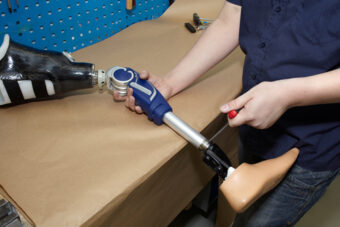 A prosthetic limb is a valuable tool that can greatly enhance the quality of life for someone who has undergone limb amputation. However, like any other device, it requires regular care and maintenance to ensure its optimal functionality and longevity. If you or someone you know uses a prosthetic limb, here are some must-know daily care tips to keep it in top condition.
A prosthetic limb is a valuable tool that can greatly enhance the quality of life for someone who has undergone limb amputation. However, like any other device, it requires regular care and maintenance to ensure its optimal functionality and longevity. If you or someone you know uses a prosthetic limb, here are some must-know daily care tips to keep it in top condition.
Cleaning and Hygiene
Proper cleaning and hygiene are essential for maintaining your prosthetic limb. Start by carefully inspecting the skin of your residual limb for any signs of abrasions or irritation. Clean the limb socket with mild soap and warm water or use a specialized prosthetic cleaner recommended by your prosthetist. Be sure to thoroughly dry the socket, liner, and any other removable components to prevent moisture buildup, which could lead to skin issues or an unpleasant odor.
Skin Care
Taking care of your skin is crucial when wearing a prosthetic limb. Keep the skin on your residual limb clean and moisturized to prevent dryness and cracking. Avoid using harsh soaps or lotions with fragrances that could potentially irritate the skin. It’s also important to regularly inspect your skin for any signs of redness, irritation, or pressure sores. If you notice any issues, consult your prosthetist for guidance on how to address them effectively.
Sock Management
Socks play a critical role in maintaining a proper fit and comfort of your prosthetic limb. It’s important to use the right type and thickness of socks recommended by your prosthetist. Typically, thinner socks are recommended for tighter fits, while thicker socks can help provide a better fit for looser sockets. Regularly inspect your socks for signs of wear and tear, as using worn-out socks can lead to discomfort or skin irritation. Replace them as needed to ensure optimal comfort and fit.
Proper Storage
When you’re not wearing your prosthetic limb, it’s important to store it properly to maintain its shape and functionality. A prosthetic limb should be stored in a clean and dry environment, preferably in a protective case or bag provided by your prosthetist. This will help safeguard the limb from dust, debris, and potential damage. Avoid exposing the limb to extreme temperatures or direct sunlight, as these can cause the materials to deteriorate over time.
Regular Check-ups
Regular check-ups with your prosthetist are crucial for maintaining your prosthetic limb’s performance and overall condition. They can assess the fit of your limb, make any necessary adjustments, and address any issues or concerns you may have. It’s important to communicate openly with your prosthetist about any changes in your residual limb, discomfort, or changes in your activity level, as these factors can affect the fit and function of your prosthetic limb.
Exercise and Physical Fitness
Staying active and engaging in physical fitness can have numerous benefits for prosthetic limb users. However, it’s important to be mindful of your prosthetic limb’s limitations and take proper care during exercise. Follow your prosthetist’s recommendations and guidelines for physical activity and avoid putting excessive strain or stress on your limb. Regularly inspect your prosthetic limb for any signs of damage or wear and seek professional help if you notice anything out of the ordinary.
Adapting to Climate Changes
Changes in temperature and humidity can affect the fit and comfort of your prosthetic limb. In hot weather, your residual limb may sweat more, leading to potential skin irritation or slippage. It’s important to regularly monitor the fit and adjust the number or thickness of your socks accordingly. In colder weather, you may need to wear thicker socks or layer your clothing to keep your residual limb warm. If you experience any specific challenges related to climate changes, consult your prosthetist for personalized advice.
Summary
By following these must-know daily care tips, you can ensure the longevity and optimal performance of your prosthetic limb. However, it’s important to remember that every individual’s needs and care routine may vary. Regular communication with your prosthetist is key to addressing any concerns or questions you may have and receiving personalized guidance on maintaining your prosthetic limb effectively.
Need a Prosthetic and Orthotic Laboratory in Farmingdale, NY?
Prothotic Labratories, Inc. is a family-owned and -operated prosthetics and orthotics specialist based in Farmingdale, New York since 1988. We offer the highest quality of products, services, and patient care for all of your prosthetic and orthotic management needs. We specialize in pediatric prosthetics, but also offer adult products and services as well, such as scoliosis management, creating custom-designed prosthetics for the upper or lower extremities, and much more. We also have extensive experience in the orthotic management of cerebral palsy, arthrogryposis, osteogenesis imperfecta, spinal muscular atrophy, and neuromuscular and idiopathic scoliosis. Give us a call today, or visit us for more information!
